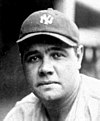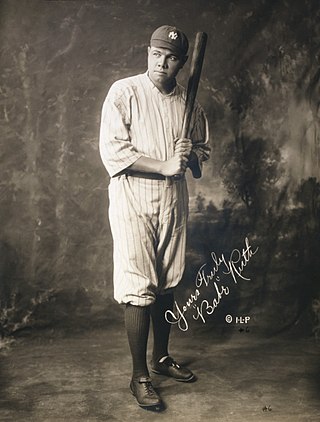
George Herman "Babe" Ruth was an American professional baseball player whose career in Major League Baseball (MLB) spanned 22 seasons, from 1914 through 1935. Nicknamed "the Bambino" and "the Sultan of Swat", he began his MLB career as a star left-handed pitcher for the Boston Red Sox, but achieved his greatest fame as a slugging outfielder for the New York Yankees. Ruth is regarded as one of the greatest sports heroes in American culture and is considered by many to be the greatest baseball player of all time. In 1936, Ruth was elected into the Baseball Hall of Fame as one of its "first five" inaugural members.
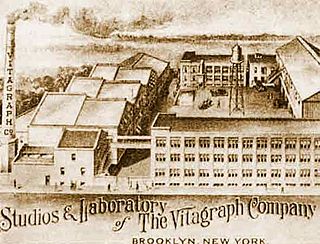
Vitagraph Studios, also known as the Vitagraph Company of America, was a United States motion picture studio. It was founded by J. Stuart Blackton and Albert E. Smith in 1897 in Brooklyn, New York, as the American Vitagraph Company. By 1907, it was the most prolific American film production company, producing many famous silent films. It was bought by Warner Bros. in 1925.
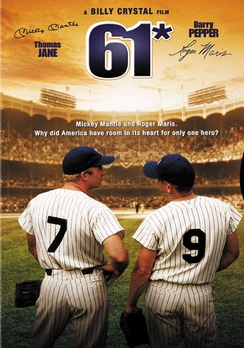
61* is a 2001 American made-for-television sports drama film written by Hank Steinberg and directed by Billy Crystal. It stars Barry Pepper as Roger Maris and Thomas Jane as Mickey Mantle on their quest to break Babe Ruth's 1927 single-season home run record of 60 during the 1961 season of the New York Yankees. The film first aired on HBO on April 28, 2001.

Norma Marie Talmadge was an American actress and film producer of the silent era. A major box-office draw for more than a decade, her career reached a peak in the early 1920s, when she ranked among the most popular idols of the American screen.
The 1932 World Series was the championship series in Major League Baseball for the 1932 season. The 29th edition of the World Series, it matched the American League champion New York Yankees versus the National League champions Chicago Cubs. The Yankees won in a four-game sweep. By far its most noteworthy moment was Babe Ruth's "called shot" home run, in his 10th and last World Series. It was punctuated by fiery arguments between the two teams, heating up the atmosphere before the World Series even began. A record 13 future Hall of Famers played in this World Series, with three other future Hall of Famers also participating: umpire Bill Klem, Yankees manager Joe McCarthy, and Cubs manager Rogers Hornsby. It was also the first World Series in which both teams wore uniforms with numbers on the backs of the shirts.

Robert William Meusel was an American baseball left and right fielder who played in Major League Baseball (MLB) for eleven seasons from 1920 through 1930, all but the last for the New York Yankees. He was best known as a member of the Yankees' championship teams of the 1920s, nicknamed the "Murderers' Row", during which time the team won its first six American League (AL) pennants and first three World Series titles.
Babe Ruth's called shot is the home run hit by Babe Ruth of the New York Yankees against the Chicago Cubs in the fifth inning of Game 3 of the 1932 World Series, held on October 1, 1932, at Wrigley Field in Chicago. During his at-bat, Ruth made a pointing gesture before hitting the home run to deep center field. One of the reporters at the game wrote that Ruth had "called his shot", using terminology from billiards. The episode added to Ruth's superstardom and became a signature event of baseball's golden age.
AFI's 100 Years...100 Stars is the American Film Institute's list ranking the top 25 male and 25 female greatest screen legends of American film history and is the second list of the AFI 100 Years... series.
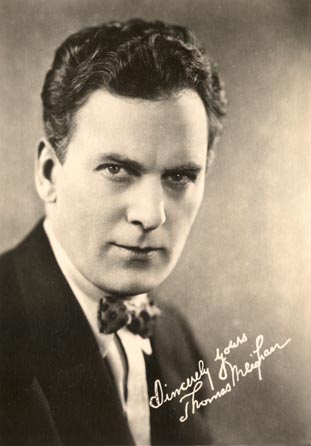
Thomas Meighan was an American actor of silent films and early talkies. He played several leading-man roles opposite popular actresses of the day, including Mary Pickford and Gloria Swanson. At one point he commanded $10,000 per week.

The Babe is a 1992 American biographical sports drama film about the life of famed baseball player Babe Ruth, who is portrayed by John Goodman. Directed by Arthur Hiller, written by John Fusco, it was released in the United States on April 17, 1992, to mixed reviews. The somewhat fictionalized account of Ruth's life begins in Maryland with his childhood. The film covers his personal life and rise as a ball player with the Red Sox, trade to New York, and decline in health and career that ends with his walking away after being a "name only" manager to boost ticket sales.

Margaret Seddon was an American stage and film actress.
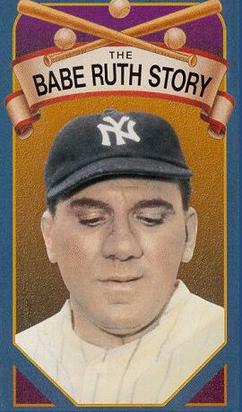
The Babe Ruth Story is a 1948 American biographical film about professional baseball player Babe Ruth (1895–1948), who achieved fame as a slugging outfielder for the New York Yankees. Directed by Roy Del Ruth, the film stars William Bendix as the ballplayer and Claire Trevor as his wife Claire Merritt Hodgson. Critics faulted the film's heavy-handedness and direction, and it is said by many to be one of the worst films ever made.
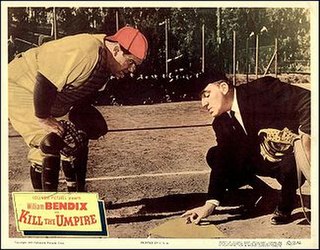
Kill the Umpire is a 1950 baseball comedy film starring William Bendix and Una Merkel, directed by Lloyd Bacon and written by Frank Tashlin.
Headin' Home or Heading Home may also refer to:

The Lady is a 1925 American silent drama film starring Norma Talmadge and directed by Frank Borzage. Talmadge's own production company produced the film with distribution by First National Pictures.

The Branded Woman is a 1920 American silent drama film released by First National Pictures. It stars Norma Talmadge who also produced the film along with her husband Joseph Schenck through their production company, Norma Talmadge Productions. The film is based on a 1917 Broadway play Branded, by Oliver D. Bailey and was adapted for the screen by Anita Loos and Albert Parker who also directed.
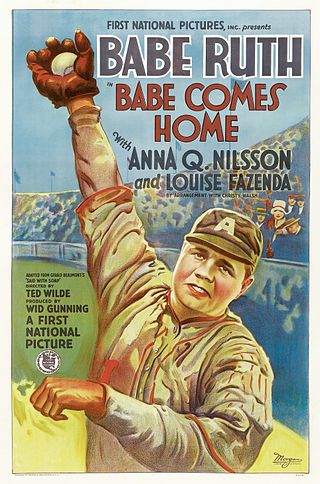
Babe Comes Home is a 1927 American silent sports comedy film produced and distributed through First National and directed by Ted Wilde. The film is a baseball-styled sports film centering on Babe Ruth and Anna Q. Nilsson and was based on the short story "Said With Soap" by Gerald Beaumont.
Babe Ruth is a 1991 American drama film directed by Mark Tinker and written by Michael De Guzman. The film stars Stephen Lang, Brian Doyle-Murray, Donald Moffat, Yvonne Suhor, Bruce Weitz and Lisa Zane. The film premiered on NBC on October 6, 1991.

Scandal is a 1917 American black and white silent comedy drama film directed by Charles Giblyn and based on a novel by Cosmo Hamilton. The film scenario is written by Bess Meredyth. It is one of the first films to star Constance Talmadge.

William Sheer (1889–1933) was a British-born American stage and film actor of the silent era.















